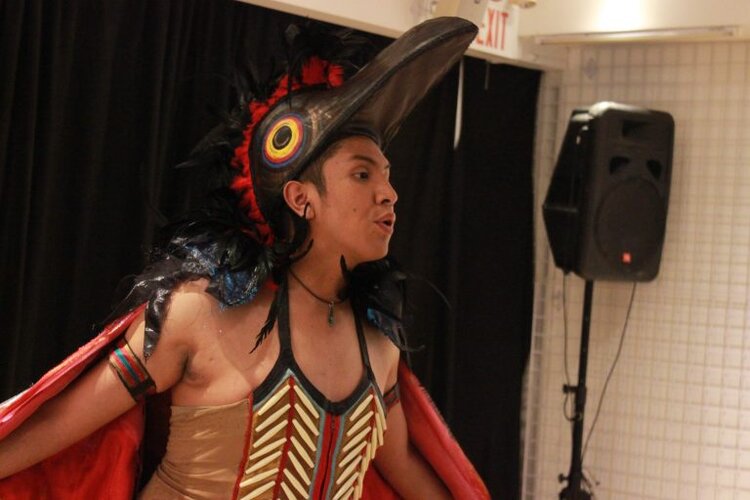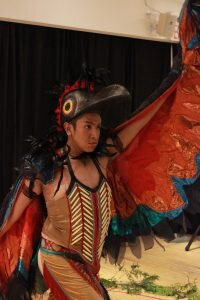The Kick and Push Festival – Agokwe

Often, the beauty of theatre is its subjective nature—we are presented with a character, a story, or a theme, and must deduce meaning from it. However, when watching Waawaate Fobister’s award-winning solo show Agokwe, Fobister gets straight to the point. Nanabush (a shape-shifting trickster that is of great importance in Indigenous culture and stories) appears onstage and tells us clearly and directly what he’s about to do, and also what he would like the audience to do after the show is done. There is an urgency to Agokwe—in the introduction, Nanabush states that “[Anishnaabe] culture is disappearing fast.” He doesn’t have time to let the audience draw their own conclusions.

Nanabush prefaces the story by talking about the history of Two-spirited people, or Agokwe, and how they used to be held in high esteem by their communities as someone with spirituality, authority, and power. He then introduces us to Jake, an Anishnaabe boy who is living in a very different world. As the story unfurls, we see why Nanabush’s urgency was needed—there are lives on the line, and perhaps by telling stories such as Agokwe over and over and over, these lives could be saved.
Agokwe has been performed in a large variety of venues—indoors and out, small and large. Fobister is an incredible performer, shifting from character to character seamlessly, engaging the audience deeply in both the comedic and the emotional moments of the story. Right now, Kingston has a chance to see the “unplugged” version of the show in the old American Apparel storefront. With a small audience and very few technical elements, Fobister describes this stripped down version of Agokwe as more raw and intimate than larger productions.
Agokwe first premiered at the Buddies in Bad Times theatre in 2008. Within a year, Fobister took home a whopping 6 Dora Mavor Moore Awards for the show, including Outstanding New Play. In the past decade, the show has been tweaked here and there, but the biggest changes have come from Fobister’s growth as a performer and as a human being: “I feel empowered every time I do it,” he says. Despite the fact that it’s been ten years since Agokwe first premiered, Fobister says that the need to tell this story remains to this day. There is still a lot of ignorance in Canada regarding Indigenous and LGBTQ communities—Fobister cites the recent changes to the school curriculum and the death of Colten Boushie as signs that there’s still a lot of work to do.
After performing this piece for such a long period of time, Fobister says he’s almost ready to retire from the role, however, he is very open to the possibility of another actor taking it on and continuing to tell the story. Agokwe is an important reminder of why theatre and storytelling is so important in the first place. Nanabush opens and closes the play by telling the audience to “tell your friends, and tell your friends to tell their friends, and tell their friends to tell their friends.” It is through talking, storytelling, and performing that healing can occur, and “we can all live together like a nice big happy family.”
When I asked Fobister what we can do to be better allies to the Indigenous and LGBTQ communities, he had two pieces of advice. One: educate yourself as much as possible, and two: try to treat each other with kindness. “Become more educated, and just be kind to one another, because we’re all human beings, no life is superior to others.”
Agokwe – Unplugged is at the old American Apparel storefront (274 Princess Street) until August 4th.
